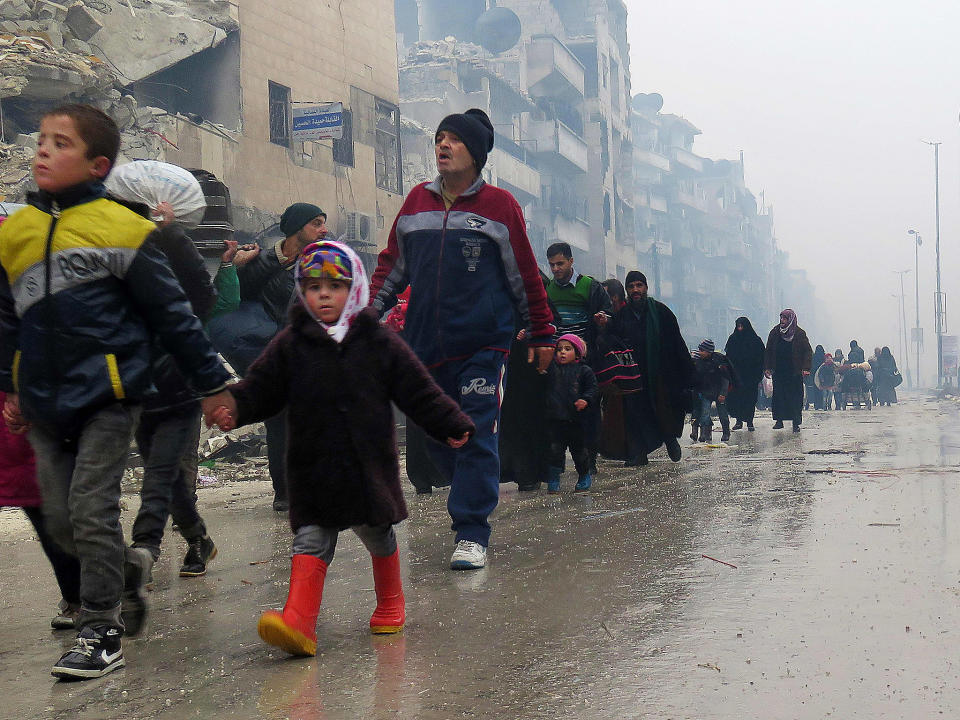The US are giving rise to Isis by ending their support to Syrian rebel forces

As the net continues to tighten around Raqqa, the capital of Isis’ "caliphate", thousands of people have been heading for Jordan: refugees desperate to get away from the fighting are trying to join the 1.3 million Syrians already across the border, in a familiar tale of the savage civil war.
But the Jordanian government has now come to the conclusion that the flow of the dispossessed has been sent in their direction by Isis with the aim of hiding fighters in their midst. There was one deadly attack in the area, at a popular tourist attraction at the end of the year, killing ten people, and there have been repeated recent signs of attempted infiltration by gunmen across the frontier.
If the movement of the refugees was truly spontaneous and undirected, say the Jordanians, it would be more logical for them to head towards the border with Turkey. Isis, they believe, could be trying to set up a new secret base in and around the Hashemite Kingdom. The US administration, meanwhile, has announced that it is ending a CIA programme for training and arming Syrian rebels which has been taking place in Jordan.
This has been presented as another sign of Donald Trump’s attempts to please the Russians and final abandonment of any ambition to remove President Bashar al-Assad by force. But the soon to be disbanded fighters were not set up to fight the regime, but Isis. It is a role they could have fulfilled in the current situation with the jihadists gathered at the border, something the Jordanian forces cannot do with King Abdullah’s government having decided a long while ago not to have boots on the ground inside Syria.
There has been plenty of criticism of the CIA programme. It was slow, the fighters it trained were few in numbers and accused of not being particularly effective on the ground. Some had even joined extremist groups with their US supplied weapons in the early days. There was also general suspicion of such clandestine missions with echoes of what took place going back to Vietnam and the Bay of Pigs invasion of Cuba.
But the ending of the scheme also smacks of the confusion and contradictions which have marked American policy in Syria. During the US presidential campaign Trump declared he wanted to work with Russia in the country. After getting to the White House he stated that support for the rebels would be ended. But then the new president became the first Western leader to bomb President Assad’s forces, giving a surge of hope to the same rebels.
Meanwhile as one “southern front” is being ended a separate operation is continuing full-throated in the east against Isis with the Kurds and Arab groups deemed as moderate beneficiaries. It is precisely because Isis is getting squeezed in that direction that the displacement is taking place towards the Jordanian border.
They are heading into an area where a fragile ceasefire – brokered by America, Russia and Jordan – appears to be holding between the regime and rebel groups. The arrival of Isis is bound to have an impact on this delicately balanced scenario with rebel groups unsure about what happens next. One of the commanders, Hassan Hamadeh of Division 101, said about the decision to abandon the CIA scheme : “We are surprised by the news, until now, nothing is confirmed. There have been no changes on the ground, coordination is ongoing, and everything has been happening normally.”
Others are worried that the American withdrawal will lead to disillusioned fighters gravitating to the extremists. Adnan Mustapha Mero, of the Omari Brigade, pointed out: “We have had this pattern before. The Western countries encourage people to rise up and fight, then they leave, people are left angry and they are recruited by Daesh (Isis) and [Jabhat] al-Nusra. The Americans don’t seem to learn from this pattern.”
The CIA programme may have run its day. But there is a need for another plan to be put in place, working with the Russians if necessary. Otherwise there is the possibility that the West will end up giving Isis, or rather whatever replaces it, a helping hand yet again.

 Yahoo News
Yahoo News 